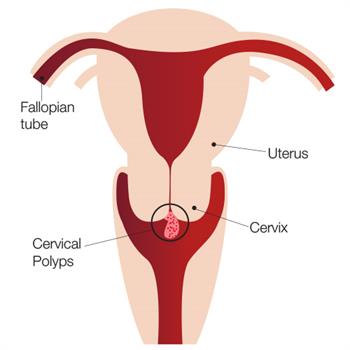What are Cervical Polyps?

These polyps can range from a few millimetres to a few centimetres in diameter. They are often picked up during routine health screenings or Pap smears. They may also be found during a gynaecological ultrasound, where the polyp is seen as an “echogenic” bright spot. Cervical polyps are common in women, regardless of age.
There are two types of cervical polyps that may occur:
Ectocervical polyps
Develop on the outer surface layer of the cervix.
Endocervical polyps
Develop from cervical glands within the cervical canal, and mostly seen attached to a thick stalk.
Cervical Polyp Symptoms
While most cervical polyps do not display any symptoms, they may occasionally cause abnormal bleeding during your menstrual cycle.
Other symptoms you may experience include:
- Heavy periods
- Bleeding after sexual intercourse
- Bleeding after menopause
- Foul-smelling vaginal discharge
These symptoms may also be indicative of other gynaecological conditions.
If you experience these symptoms, make an appointment online or contact a women's clinic near you to consult a gynaecologist.
Treating and Managing Cervical Polyps
Depending on the type of polyp and its location, there are two options to remove it:
In the doctor’s office
Your gynaecologist can remove cervical polyps that are small and located outside of the cervix. Your gynaecologist will grasp the polyp with a pair of forceps, and remove it with a gentle twisting motion.
Surgical removal
Larger polyps, or those located deep within the cervix, may need to be removed via a polypectomy or a dilation and curettage.
These procedures are performed in an operating theatre, usually under general anaesthesia to reduce the amount of pain felt. Your gynaecologist will send the removed polyp for further testing and assessment.
Preventing Cervical Polyps
While cervical polyps do not grow back after being removed, women with prior cervical polyps are at higher risk of growing more polyps. Regular health screening and Pap smears will help detect any polyps early.
Make an Appointment
Make an appointment online or contact a women's clinic near you to consult a gynaecologist. To make an appointment, select "Specialist Appointment". Under Specialist Appointment Details, select "Obstetrics & Gynaecology".
Make an enquiry. We will get back to you within 2 working days. You can reach us at 6311 1230.